Stop Kony: Why is the viral video so successful?
As debate rages over the Kony video, one social media expert tells Channel 4 News that despite its flaws, the film “sets new standards” for media campaigns and “highlights the power of celebrity”.
The film about the atrocities carried out by Joseph Kony’s Lord’s Resistance Army in Uganda has become a global internet sensation, clocking up more than 50 million views on YouTube by Friday.
In the video above, you can see a group of teenagers discussing the film with Channel 4 News presenter Krishnan Guru-Murphy and explaining why it has captured their attention online and offline.
Despite high-profile support, the 30 minute documentary has drawn fierce criticism for simplifying the complex war and politics in Africa and for what many see as a colonialist approach to Africa’s problems.
‘Questionable motives’
Concerns have also been raised over the questionable motives of Invisible Children, the charity behind the campaign. According to its own financial admissions, the advocacy group spent $8.9m and only $2.8m actually went to help Uganda.
Director of digital agency DuckRabbit, Benjamin Chesterton, who has also worked in international development for the BBC’s World Service Trust in Africa, told Channel 4 News that in terms of audience reach and generating mass media interest, it is one of the most successful media campaigns yet.
“The major reason it’s being shared is because they’ve hit celebrities. Of course it has high production values, and it’s aspirational and gimmicky, but in the first seven days on Vimeo it had hardly any views.
We should be critical of the way it’s presented and what they’re advocating, but all organisations use tricks to attract media attention. The amount of money they’ve spent making the film is comparable to how much a charity like Save the Children would spend on a 90 second TV advertisement –Benjamin Chesterton, Director of digital agency DuckRabbit
“Then they had a huge push with targeting celebrities and it began trending worldwide. Then the mainstream media picked it up and it’s taken off from there,” Mr Chesterton said.
Celebrity power
Movement director of Invisible Children, Zach Barrows, makes no apologies for the targeted social media campaign “to make Kony famous” which was re-tweeted by a range of celebrities from Oprah to Justin Bieber and MC Hammer.
“It’s not that their voice is more important than anyone else’s but it’s that they have a huge platform. If Oprah, or Justin Bieber or Tim Tebow sends a tweet out, millions of people hear about it and that’s an amazing thing,” he said.
But Mr Chesterton told Channel 4 News that while he welcomes the debate, people should not be too quick to judge the amount of money spent on the campaign.
“We should be critical of the way it’s presented and what they’re advocating, but all organisations use tricks to attract media attention. The amount of money they’ve spent making the film is comparable to how much a charity like Save the Children would spend on a 90 second TV advertisement. And if you look at the reach of this, it’s unbelievable value.”
“Personally, I think the disappointiment is what a shame it is that it was this subject and they didn’t get to the heart of some of the much more pertinent issues in Africa around health or women’s rights.”
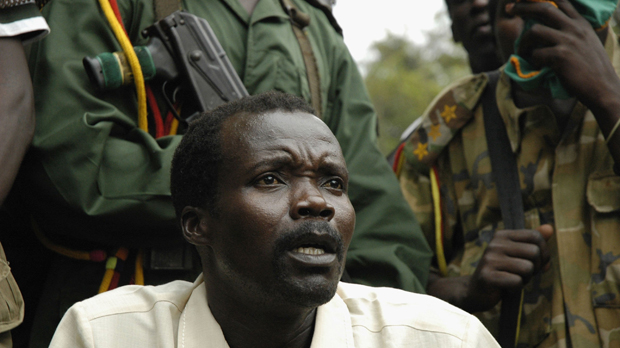
Defying social media logic
He told Channel 4 News that despite the criticism, the filmmakers would be “patting themselves on the back” for defying the logic of viral videos, which usually run for less than a minute.
“There is not a set of rules for social media. But we’re certainly seeing a shift in what captures people’s attention. We also can’t say how many people have actually watched it. Fifty million might have clicked on it, but how many of those swtiched off after four minutes?”
Who are the world’s biggest war criminals at large?
As Jospeh Kony is thrust into the spotlight in the viral video campaign, we take a look at some of his lesser known LRA war commanders and other war criminals who are wanted by the International Criminal Court.
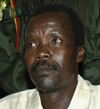
JOSEPH KONY
The alleged leader of the Lord’s Resistance Army, an armed rebel group that operated in Uganda.
Kony was indicted in July 2005 on 12 counts of crimes against humanity and 21 counts of war crimes.
He is currently at large and his whereabouts are unknown.
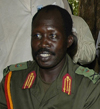
OKOT ODHIAMBO
Alleged to be an integral member of the Lord’s Resistance Army, an armed group opposing the government in Uganda.
Odhiambo was indicted on 8 July 2005 on three counts of crimes against humanity and seven counts of war crimes.
He is currently at large as a fugitive.
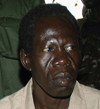
VINCENT OTTI
Alleged commander in the Lord’s Resistance Army.
Indicted in 2005 on eleven counts of crimes against humanity and 21 counts of war crimes.
The ICC says Otti remains at large despite rumours he has died in the jungle.
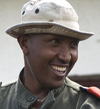
BOSCO NTAGANDA
Alleged to be the third-highest ranking official in the Patriotic Force for the Liberation of the Congo, a rebel movement in the northeast part of the Democratic Republic of Congo. He was indicted on 22 August 2006 on three counts of war crimes.
Since being indicted, Ntaganda has become a general in the Congolese armed forces and lives in the Kivu province of eastern Congo.
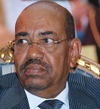
OMAR AL-BASHIR
The President of Sudan was indicted on 4 March 2009 on five counts of crimes against humanity and two counts of war crimes related to the situation in Darfur, Sudan. He is openly living in Sudan and since the ICC’s warrants were issued he has travelled to several countries and not been arrested.
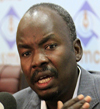
AHMED HAROUN
Allegedly co-ordinated the operations of Sudanese military, police and Janjaweed forces in Darfur while he was Minister of State for the Interior in Sudan.
He was indicted on 27th April 2007 on 20 counts of crimes against humanity and 22 war crimes. He has continued to play an active role in the Sudanese government, which has refused to co-operate with the Court.
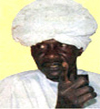
ALI KUSHAYB
Kushayb is the alleged leader of the Janjaweed militia.
He was indicted in April 2007 on 22 counts of crimes against humanity and 28 counts of war crimes.
Kushayb remains at large.
The White House has praised Invisible Children for “raising awareness about the horrific activities of the LRA” but it stresses that the problem is multi-faceted.
“Certainly we appreciate the efforts of the group. But there are NGO groups who have been working on this problem for decades, and we of course are very much involved in trying to support all the states of east and central Africa,” State Department spokeswoman Victoria Nuland said.
Lindsey Hilsum blogs – Kony 2012: inaccuracies aside, this is how to spread a message
We have a multi-faceted strategy to work on this, including, as you know, we now have Special Forces advisers working to train some of the neighbouring states in their efforts to get a handle on this awful, awful problem.”
-
Latest news
-
Yungblud launches his own affordable music festival5m

-
Why these Americans want to quit their state9m

-
Company behind infected water outbreak are ‘incompetent’ says local MP5m

-
Israeli forces push deeper into Northern and Southern Gaza4m

-
India’s ‘YouTube election’: Influencers enlisted to mobilise youth vote6m

-




